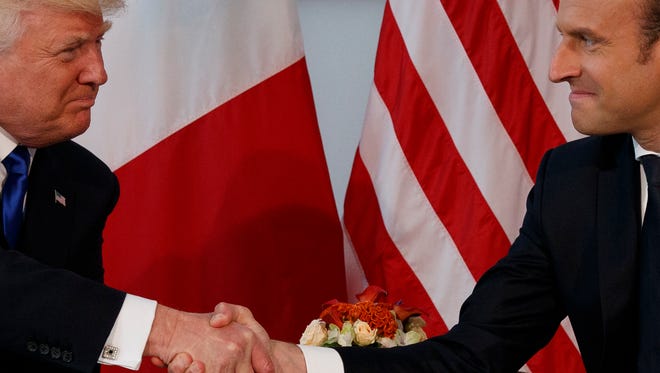President Trump to travel to Paris for Bastille Day
 David Jackson
David Jackson
WASHINGTON – President Trump will travel to Paris next month for a Bastille Day parade and a commemoration of the 100th anniversary of the entry of the United States into World War I, the White House announced Wednesday.
"The two leaders will further build on the strong counterterrorism cooperation and economic partnership between the two countries, and they will discuss many other issues of mutual concern," press secretary Sean Spicer said in a statement.
President Emmanuel Macron extended the invitation in a phone call Tuesday with Trump.
In accepting the invitation for Bastille Day, July 14, Trump "looks forward to reaffirming America’s strong ties of friendship with France, to celebrating this important day with the French people, and to commemorating the 100th anniversary of America’s entry into World War I," Spicer said.
The surprise trip will take place less than a week after Trump, Macron and other world leaders gather July 7-8 for a G-20 summit in Hamburg, Germany. Trump, who lamented the length of his late May trip to the Middle East and Europe, is now slated to make two transatlantic trips in less than ten days.
The Paris visit will also spotlight the sometimes testy relationship between Trump and Macron, a 39-year-old investment banker who was elected president of France in early May.
The new French leader has criticized Trump for pulling the United States out of the Paris climate change agreement. The two men also had what appeared to be an aggressive, almost competitive handshake when they met last month on the sidelines of a NATO summit in Brussels.
In their phone call, Trump and Macron pledged cooperation on other issues, including a common response should Syria again use chemical weapons.
"The two presidents spoke about the situation in the (Persian) Gulf and the need to avoid any escalation in the region," said a statement from Macron's office. "Both stressed that the fight against terrorism and its financing is a common challenge for all the countries of the region."
Trump is unpopular in France, according to public opinions polls, in part because he has criticized French security after a series of terrorist attacks. During his 2016 campaign, Trump said he didn't want to visit France because it wouldn't be safe.
Shortly after a terrorist attack in Nice on Bastille Day of last year, Trump said, "I wouldn't go to France because France is no longer France ... They won't like me for saying that, but you see what happened in Nice."